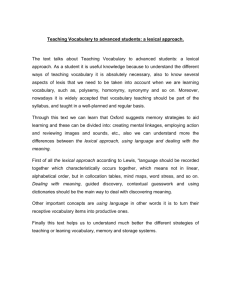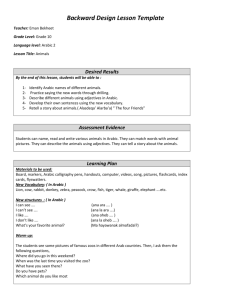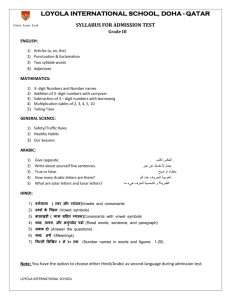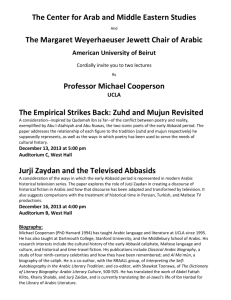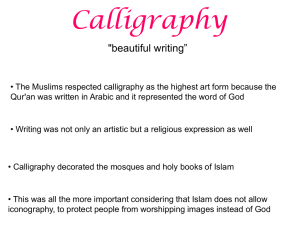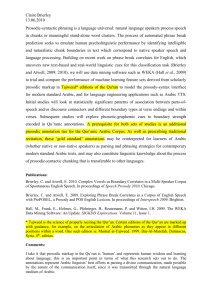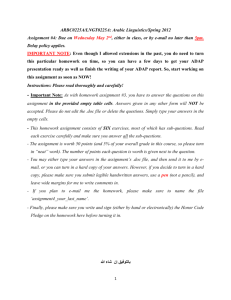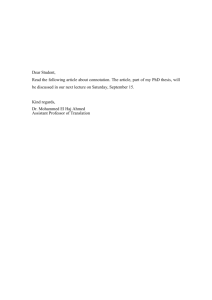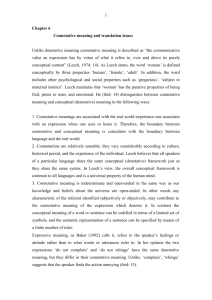English-Arabic Translation: Lexical Issues
advertisement
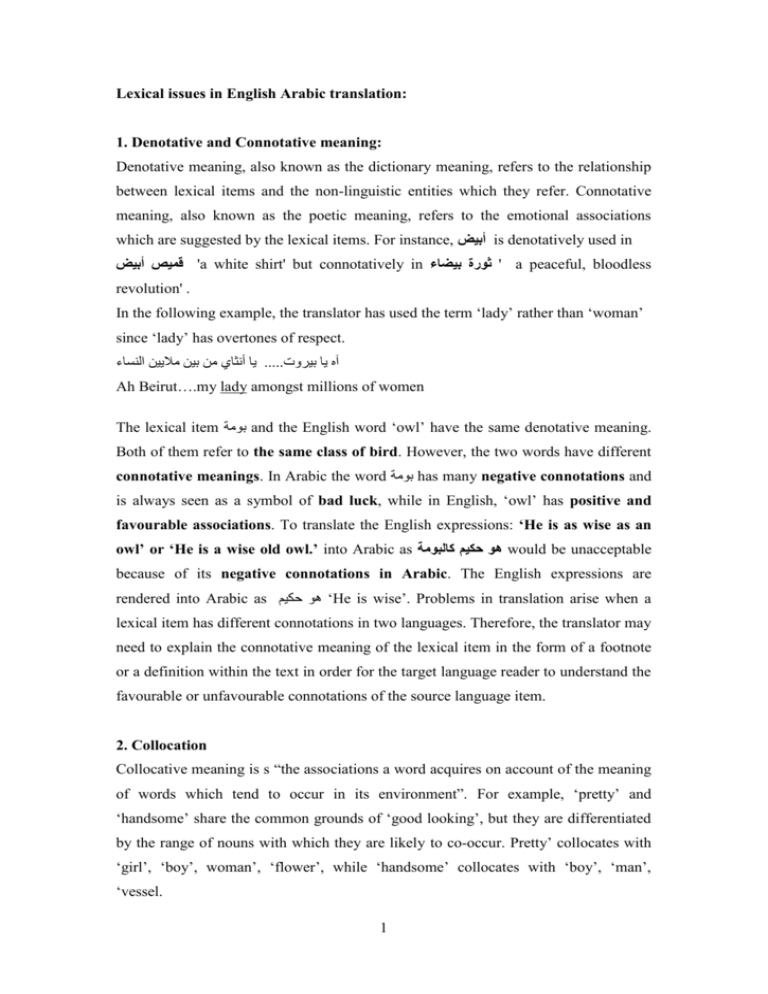
Lexical issues in English Arabic translation: 1. Denotative and Connotative meaning: Denotative meaning, also known as the dictionary meaning, refers to the relationship between lexical items and the non-linguistic entities which they refer. Connotative meaning, also known as the poetic meaning, refers to the emotional associations which are suggested by the lexical items. For instance, أبيضis denotatively used in ' قميص أبيضa white shirt' but connotatively in ' ثورة بيضاءa peaceful, bloodless revolution' . In the following example, the translator has used the term ‘lady’ rather than ‘woman’ since ‘lady’ has overtones of respect. يا أنثاي من بين ماليين النساء.....آه يا بيروت Ah Beirut….my lady amongst millions of women The lexical item بومةand the English word ‘owl’ have the same denotative meaning. Both of them refer to the same class of bird. However, the two words have different connotative meanings. In Arabic the word بومةhas many negative connotations and is always seen as a symbol of bad luck, while in English, ‘owl’ has positive and favourable associations. To translate the English expressions: ‘He is as wise as an owl’ or ‘He is a wise old owl.’ into Arabic as هو حكيم كالبومةwould be unacceptable because of its negative connotations in Arabic. The English expressions are rendered into Arabic as ‘ هو حكيمHe is wise’. Problems in translation arise when a lexical item has different connotations in two languages. Therefore, the translator may need to explain the connotative meaning of the lexical item in the form of a footnote or a definition within the text in order for the target language reader to understand the favourable or unfavourable connotations of the source language item. 2. Collocation Collocative meaning is s “the associations a word acquires on account of the meaning of words which tend to occur in its environment”. For example, ‘pretty’ and ‘handsome’ share the common grounds of ‘good looking’, but they are differentiated by the range of nouns with which they are likely to co-occur. Pretty’ collocates with ‘girl’, ‘boy’, woman’, ‘flower’, while ‘handsome’ collocates with ‘boy’, ‘man’, ‘vessel. 1 Collocations differ from one language into another. English and Arabic use different collocational patterns that reflect the preferences of each community for certain modes of expression and certain linguistic configurations. For example, the English ‘deliver’ collocates with ‘letter’, ‘speech’, ‘news’, ‘blow’, ‘verdict’, ‘a baby’. Arabic, on the other hand, uses different verbs, as shown in the following examples: English Collocation deliver a letter/telegram deliver a speech/lecture deliver news deliver a blow deliver a verdict deliver a baby Arabic equivalent يسلم خطابا \ تلغرافا يلقي خطبة\ محاضرة ينقل أخبارا يوجه ضربة يصدر حكما يولد امرأة In the following set of collocations the English ‘catch’ collocates with ‘fish’, ‘cold’, ‘train’, ‘fire’. Arabic, on the other hand, uses different verbs, as shown in the following examples: English Collocation catch a fish catch a cold catch a train catch fire Arabic equivalent يصطاد سمكة يصاب بنزلة بر د يلحق بالقطار تشتعل فيه النار The English-Arabic translator should pay considerable attention to the collocational differences between the two languages in order to choose the appropriate collocation in the target language. A translator who renders ‘shake hands’ as يهزاأليديwould give an erroneous translation. The Arabic equivalent for the English collocation ‘shake hands’ is يصافح, which is not a collocation in Arabic. 3. Synonymy It refers to 'sameness' in meaning. Semanticists often agree that 'total synonymy' is unlikely and that 'synonymy 'among lexical items could occur if the items are close enough in their meanings to allow a choice to be made between them in some contexts. For instance in English 'begin' and 'commence' can be considered synonyms because they can substitute for each other in almost all cases, as the following examples show: 1. The church service commences at 11.00 a.m on Sundays. 2. The church service begins at 11.00 a.m on Sundays. 2 Two or more synonymous words or expressions may differ in style. For example, ‘die’, ‘pass away’, ‘kick the bucket’, ‘decease’ and ‘croak’ differ with regard to the degree of formality and/or politeness. In Arabic, the lexical item توفيis more formal than مات. Other euphemistic expressions of death are انتقل إلى رحمة هللاand انتقل إلى جوار ربه. The two expressions can be translated into English as ‘passed away’, a term that would roughly convey the intended meaning of the Arabic expressions in an appropriate way. 3


